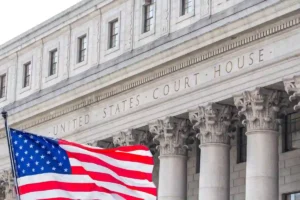Introduction to the DoubleVerify Class Action Lawsuit
If you suffered substantial losses and wish to serve as lead plaintiff of the DoubleVerify class action lawsuit, or just have general questions about you rights as a shareholder, please contact attorney Timothy L. Miles of the Law Offices of Timothy L. Miles, at no cost, by calling 855/846-6529 or via e-mail at [email protected]. Lead plaintiff motions for the DoubleVerify lawsuit must be filed with the court no later than July 21, 2025.
DoubleVerify Holdings, Inc. Company Profile

DoubleVerify (“DV”) (NYSE: DV) is traded on the New York Stock Exchange under the symbol “DV.” The company is a leading software platform for digital media measurement and analytics. Their mission is to make the digital advertising ecosystem stronger, safer and more secure, thereby preserving the fair value exchange between buyers and sellers of digital media. Hundreds of Fortune 500 advertisers employ their unbiased data and analytics to drive campaign quality and effectiveness, and to maximize return on their digital advertising
investments – globally.
Industry
Software, focused on digital media measurement and analytics.
Stock Information
- Ticker Symbol: DV
- Exchange: NYSE
- Current Stock Price (as of June 20, 2025): $14.18
- Market Cap (as of June 20, 2025): $2.3B
Headquarters
New York, NY
Mission
To strengthen the effectiveness and transparency of digital advertising.
Solutions
- DV Authentic Ad: Safeguards your campaigns by evaluating ads for fraud, brand safety, and viewability.
- DV Authentic Attention: Delves into user interactions, ensuring your ads resonate.
- Custom Contextual: Seamlessly matches ads with relevant content to enhance engagement.
- Scibids AI: Leverages AI to maximize ad performance, driving better results.
- Supply-Side Solutions: Validates inventory quality for peace of mind.
Understanding Securities Fraud Class Action Lawsuits
Securities fraud class action lawsuits represent a significant legal mechanism for investors who have suffered financial losses due to corporate malfeasance. These lawsuits, such as the DoubleVerify lawsuit, typically arise when a company or its executives engage in deceptive practices that mislead investors about the company’s financial health or prospect.
The goal of such litigation is to hold the perpetrators accountable and secure compensation for the affected investors. Securities fraud encompasses a range of activities, including insider trading, false financial statements, and misleading disclosures, all of which can severely impact market integrity and investor confidence.

In a class action context, a group of investors collectively brings the lawsuit against the defendant, which could be a corporation or its executives. This collective approach is particularly powerful in the securities realm because it allows individual investors, who might not have the resources to pursue litigation on their own, to band together and seek justice.
The class action mechanism ensures that the legal process is efficient and that the interests of all affected investors are represented.
The complexity of securities fraud class action lawsuits requires plaintiffs to navigate a labyrinth of legal standards and procedural hurdles. One of the most significant challenges is surviving a motion to dismiss, a legal maneuver by the defendants to have the case thrown out before it reaches trial.
Understanding the nuances of these lawsuits is crucial for any stakeholder involved, as it sets the stage for the strategic decisions that will follow. In the case of the DoubleVerify class action lawsuit, these elements come into sharp focus, highlighting the importance of a well-crafted legal strategy.
Overview of the DoubleVerify Class Action Lawsuit
The DoubleVerify lawsuit is a securities class action lawsuit that centers on allegations of misleading investors through the provision of inaccurate or incomplete information regarding the company’s financial status and operations. Such allegations, if proven true, could result in significant legal and financial consequences for DoubleVerify. You need to grasp the magnitude of these claims and their

potential impact on the company’s future.
Understanding the lawsuit requires analyzing the details of the allegations. Investors claim that DoubleVerify’s disclosures were not as transparent as they should have been, leading to financial losses once the truth was revealed. Legal experts are examining whether there was a deliberate attempt to mislead stakeholders, which could lead to punitive measures.
For anyone involved in investing, the DoubleVerify lawsuit serves as a stark reminder of the importance of due diligence and the risks associated with corporate investments. As you navigate through the nuances of this case, consider how transparency and accountability play pivotal roles in maintaining investor trust and confidence in the market.
Allegations in the DoubleVerify Class Action Lawsuit
DoubleVerify provides media effectiveness platforms.
The DoubleVerify lawsuit alleges that defendants throughout the Class Period made false and/or misleading statements and/or failed to disclose that:
- DoubleVerify’s customers were shifting their ad spending from open exchanges to closed platforms, where DoubleVerify’s technological capabilities were limited and competed directly with native tools provided by platforms like Meta Platforms and Amazon;
- DoubleVerify’s ability to monetize on its Activation Services was limited because the development of its technology for closed platforms was significantly more expensive and time-consuming than disclosed to investors;
- DoubleVerify’s Activation Services in connection with certain closed platforms would take several years to monetize; (iv) DoubleVerify’s competitors were better positioned to incorporate AI into their offerings on closed platforms, which impaired DoubleVerify’s ability to compete effectively and adversely impacted DoubleVerify’s profits;
- DoubleVerify systematically overbilled its customers for ad impressions served to declared bots operating out of known data center server farms; and
- DoubleVerify’s risk disclosures were materially false and misleading because they characterized adverse facts that had already materialized as mere possibilities.

The DoubleVerify class action lawsuit further alleges that on February 28, 2024, DoubleVerify issued lower revenue growth expectations for the first quarter of 2024 due to “a slow start by brand advertisers and a slow ramp by recently signed” customers. On this news, the price of DoubleVerify stock fell more than 21%, according to the DoubleVerify lawsuit.
Then, on May 7, 2024, DoubleVerify cut its full-year 2024 revenue outlook due to customers that were pulling back on their ad spending. On this news, the price of DoubleVerify stock fell nearly 39%, according to the complaint.
The lawsuit further alleges that on February 27, 2025, DoubleVerify reported lower-than-expected fourth quarter 2024 sales and earnings due in part to reduced customer spending, and defendants further disclosed that the shift of ad dollars from open exchanges to closed platforms was negatively impacting DoubleVerify.
On this news, the price of DoubleVerify stock fell more than 36%, according to the DoubleVerify lawsuit.
The Lead Plaintiff Process Under the PSLRA and Its Impact on the DoubleVerify Lawsuit
The Lead Plaintiff process under the Private Securities Litigation Reform Act (PSLRA) of 1995 is a critical component of securities class action lawsuits, including those like the DoubleVerify class action lawsuit. Enacted to curb frivolous or unwarranted litigation, the PSLRA establishes a framework for appointing a lead plaintiff who will represent the interests of all class members and oversee the litigation process.
]Upon filing a securities class action lawsuit, a notice must be published to inform potential class members of the pending action and their right to move for appointment as lead plaintiff. This notice must be disseminated within 20 days of filing.

Interested parties then have 60 days from the notice publication date to file a motion with the court to be appointed as lead plaintiff. The court evaluates these motions by applying criteria outlined in the PSLRA, primarily focusing on the financial interest of the movants in the relief sought by the class.
The individual or entity with the largest financial interest is presumed to be the most adequate plaintiff and is typically appointed as the lead plaintiff, provided they can also satisfy typicality and adequacy requirements under Rule 23 of the Federal Rules of Civil Procedure.
Once appointed, the lead plaintiff has significant responsibilities, including selecting and retaining class counsel to prosecute the case on behalf of all class members. The lead plaintiff must also oversee litigation decisions, ensuring they align with the best interests of the class.
In cases like the DoubleVerify class action lawsuit, having a strong and proactive lead plaintiff can significantly impact the outcome, helping to secure more favorable settlements or judgments. The PSLRA’s structured approach aims to balance the scales by empowering institutional investors or individuals with substantial stakes in the lawsuit to steer complex securities litigation more effectively.
The Lead Plaintiff Deadline in the DoubleVerify Class Action Lawsuit
Lead plaintiff motions for the DoubleVerify class action lawsuit must be filed with the court no later than July 21, 2025. When a securities class action is filed:
- The person who files the first complaint is required to publish a notice announcing the filing.
- Anyone who wants to be the lead plaintiff on behalf of the class must thereafter file a motion to be appointed as lead plaintiff(s) no later than 60 days after the notice was published.
The Benefits of Serving as a Lead Plaintiff in the Doubleverify Lawsuit
- Negotiating more competitive attorney fees and reducing litigation costs.
- Managing the litigation by overseeing the progress of the case and reviewing important filings.
- Participating in mediation and settlement discussions.
- Having a voice in decision-making processes regarding the settlement.
- No financial risk, as lead counsel covers all costs and expenses and are paid only if they secure a settlement or judgment recovery for the class
- Potentially enjoying long-term benefits from governance reform resulting from the litigation.
The Responsibilities the Lead Plaintiff Will Have in the Doubleverify Lawsuit
- Selecting, monitoring, and overseeing Lead Counsel.
- Reviewing and commenting on court filings on behalf of the class.
- Discussing litigation strategies with the Lead Counsel.
- Attending depositions (if necessary) and giving a deposition.
- Attending hearings (if necessary).
- Participating in mediation and the trial (if necessary).
- Provide input on any decision concerning the settlement of the securities class action.
The Eligibility Criteria for Lead Plaintiff Appointment in the Doubleverify Class Action Lawsuit
To be eligible for appointment as the lead plaintiff in the DoubleVerify class action lawsuit, an investor must meet the following criteria:
- Securities Acquisition: The investor must have purchased or acquired DoubleVerify Holdings, Inc. (NYSE: DV) common stock between November 10, 2023 and February 27, 2025.
- Financial Losses: The investor must have suffered financial losses as a direct result of the alleged securities fraud perpetrated by Doubleverify and its executives.
- Typicality and Adequacy: The investor’s legal claims must be typical of those asserted on behalf of the class, and they must demonstrate their ability to adequately represent the interests of the entire class through experience, resources, and the absence of conflicts of interest.
It is crucial to note that both domestic and international investors who meet these criteria are eligible to seek appointment as the lead plaintiff in the class action lawsuit, as courts have consistently recognized the rights of non-U.S. investors in securities class actions.
The Legal Requirements for Prevailing in the Doubleverify Lawsuit
- Material Misrepresentation or Omission
- Scienter
- Connection to Securities Transaction
- Reliance
- Economic Loss
- Loss Causation
Opting-out of the Doubleverify Class Action Lawsuit
Opting out of a class action lawsuit involves an individual choosing not to participate as a member of the class. In the context of the DoubleVerify class action lawsuit, this means that a shareholder or other affected party would decide to pursue their own separate legal action rather than be part of the collective lawsuit.
Opting out can be a strategic decision based on various factors such as the desire for greater control over the litigation process, potential for a larger individual settlement, or differing personal circumstances that may not align with the class’s claims.

When an individual opts out of a class action, they retain the right to file their own lawsuit against the defendant, in this case, Vestis. This decision must be made within a specified timeframe and in accordance with the procedures outlined by the court overseeing the class action.
It is essential for individuals considering this option to thoroughly evaluate their legal standing and consult with an attorney who can provide guidance tailored to their specific situation.
The DoubleVerify class action lawsuit, like many class actions, seeks to address grievances shared by a large group of plaintiffs who have been similarly affected by the company’s actions. While participating in a class action can streamline the litigation process and reduce individual legal costs, opting out allows for a more customized approach to seeking justice and compensation.
This decision should be made carefully, weighing the potential benefits and drawbacks in light of one’s unique circumstances and goals. If you have substantial losses, you may want to consider opting-out, but remember if you do, you will not be able to participate in any settlement in the DoubleVerify lawsuit.
Tips for Investors to Take to Protect their Interest in the Doubleverify Lawsuit
Gathering and Organizing Relevant Evidence
In a securities class action lawsuit just like the DoubleVerify class action lawsuit, evidence is the cornerstone of building a compelling case. For shareholders, gathering and organizing relevant evidence is a critical step in substantiating claims of corporate misconduct. The evidence typically revolves around documents and communications that demonstrate the company’s misrepresentations or omissions, as well as the financial harm suffered by shareholders. Below are some steps you should take:
- Compile all financial statements, press releases, analyst reports, emails, and any internal documents that shed light on the alleged wrongdoing alleged in the DoubleVerify class action lawsuit.
- Meticulously document your investment history with the DoubleVerify, including dates of stock purchases and sales, quantities, and prices. This information is crucial for calculating damages and proving that the shareholder suffered financial losses as a result of the company’s actions.
- Maintaining detailed records not only strengthens the individual’s position in the lawsuit but also contributes to the overall strength of theDoubleVerify class action lawsuit, by providing a clear picture of the impact on shareholders.
- Organizing this evidence in a systematic manner is equally important. Shareholders can create a comprehensive file of all relevant documents, categorized by type and date, to facilitate easy retrieval and review by legal counsel.

This preparation not only aids in the efficient prosecution of the DoubleVerify lawsuit, but also demonstrates the shareholder’s commitment and readiness to actively participate in the litigation process.
By thoroughly gathering and organizing evidence, shareholders lay a solid foundation for holding corporations accountable and seeking redress for their financial injuries.
Staying Informed: Monitoring Case Developments
In the fast-paced environment of securities class action lawsuits, staying informed about case developments is crucial for shareholders. As the DoubleVerify class action lawsuit, moves forward, new information and events can significantly impact the strategy and potential outcomes. UroGen shareholders must actively monitor key milestones, such as court rulings, settlement negotiations, and any changes in the legal landscape. Keeping abreast of these developments ensures that shareholders are well-positioned to make timely and informed decisions.
Effective communication with legal counsel is essential for staying updated on case developments. Attorneys provide regular updates and analyses of the ongoing proceedings, helping shareholders understand the implications of each development. This information is vital for assessing the potential risks and benefits of different courses of action, such as whether to accept a settlement offer or continue pursuing the DoubleVerify lawsuit.
By maintaining open lines of communication with their legal team, shareholders can remain engaged and proactive throughout the litigation process.
Shareholders can also benefit from following news sources and industry reports related to the DoubleVerify lawsuit and the defendant company. These sources can provide valuable insights into broader market trends, regulatory changes, and public perceptions that may influence the case. By staying informed, shareholders can better anticipate shifts in the legal and financial landscape, enabling them to adapt their strategies and protect their interests effectively.
In securities class actions, knowledge is power, and staying informed is a key component of successful participation.
Frequently Asked Questions About the Doubleverify Lawsuit

What initiated the Doubleverify class action lawsuit?
The lawsuit was initiated by investors alleging that Doubleverify provided misleading information regarding its financial health and operations, resulting in financial losses.
How can I join the Doubleverify lawsuit?
If you purchased shares during the class period and suffered a loss, then you are automatically a member of the class and do not need to do anything at this point unless you are considering moving for lead plaintiff.
What are the potential benefits of a class action lawsuit?
Class action lawsuits allow individual investors to collectively seek justice and compensation, which might be challenging to pursue individually. They also promote corporate accountability.
How long will the lawsuit take to resolve?
The duration of class action lawsuits can vary significantly, depending on the complexity of the case, legal strategies, and whether settlements are reached. It could take several months to years.
Contact Timothy L. Miles Today About an Doubleverify Class Action Lawsuit
If you suffered losses in Doubleverify stock, call us today for a free case evaluation about an Doubleverify Class Action Lawsuit. 855-846-6529 or [email protected] (24/7/365).
Timothy L. Miles, Esq.
Law Offices of Timothy L. Miles
Tapestry at Brentwood Town Center
300 Centerview Dr. #247
Mailbox #1091
Brentwood,TN 37027
Phone: (855) Tim-MLaw (855-846-6529)
Email: [email protected]
Website: www.classactionlawyertn.com





